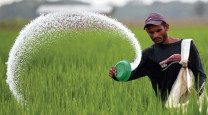E-commerce a goldmine for women
Online platform founder says digital channels unlocking opportunities for women

As the e-commerce industry picks up pace in the country, experts believe that it is unlocking new avenues of economic opportunities for women as well.
“E-commerce gives a huge opportunity to women in Pakistan, as it enhances their reach to a larger audience for showcasing their products from the convenience of their homes,” PakistanCreates founder Mahe Zehra Husain told The Express Tribune.
She was of the view that economic opportunities coming through e-commerce were especially true for cottage industries, where people produced goods on a small scale in their homes.
E-commerce can help in marketing and promoting handmade/ indigenous crafts and help in increasing their sales. “There is so much unexplored talent in Pakistan,” she said.
Talking about Pakistani women, Husain said that they were amazing at multitasking.
They were already making use of the digital age by launching their businesses on social media, she said, adding that all they needed was a little bit of help on the technological side.
“Considering this, we decided to launch an online marketplace for local talented makers to showcase and sell unique and creative items.”
Although women were already selling goods on existing e-commerce platforms, Husain underlined that a chunk of talented women was still unserved.
Citing reasons, she said that the biggest factor was the cost associated with every platform. They have to pay a hefty registration fee to sell their products on e-commerce platforms, “which most of them cannot afford”.
This add-on cost including registration fee, subscription fee, hidden charges, etc made it hard for the talented young women to sell their creative items online, she added.
Moreover, none of these platforms were aimed at promoting handmade or “Made in Pakistan” products, she said and added that their products “get lost in the noise”.
Women were almost half of Pakistan’s population, Husain pointed out and emphasised the need to empower and facilitate this huge community, most specifically women belonging to remote and rural areas.
“I have felt over the years that women are remarkably talented but are mostly held back either due to lack of resources or family responsibilities,” she underlined.
“The talent we have here (Pakistan) is incredible, the only problem is curating and discoverability.”
Women in Pakistan were showing great interest in e-commerce “as sellers”, she revealed, adding that most of the creative businesses online were run by women. “They are making use of all the digital tools they have.”
However, they lacked a place (online) where they could create a web store and sell their products in an organised fashion, she pointed out.
“It is very hard for a business to scale if it has 100 direct messages to answer and most of them are queries about price or other such things.”
She maintained that having a website was a much easier way to scale and track orders for businesses. Buyers could also easily track their shopping by landing on the seller’s website, she added.
Regarding payment methods, she pointed out that payment gateway incorporation required cumbersome paperwork, which most of the sellers operating on a small scale avoided.
“There has to be a simpler way,” Husain said, adding that there should be different taxation laws for small-scale sellers, as they are doing business in a price-sensitive market, which makes their profit margins thin.
“It would be amazing if the government takes note of these facts and works to empower small sellers,” she said.
“E-commerce not only contributes to increasing global trade but is also bridging digital divide in Pakistan,” said Mobilink Microfinance Bank CEO Ghazanfar Azzam.
Around 49% of Pakistan’s population comprised women, but their share in economic activities remained “extremely low”, he lamented.
“To equip women with necessary skills to earn a living, building their capabilities at grass roots level is critical,” he maintained.
Published in The Express Tribune, November 28th, 2021.
Like Business on Facebook, follow @TribuneBiz on Twitter to stay informed and join in the conversation.



















COMMENTS
Comments are moderated and generally will be posted if they are on-topic and not abusive.
For more information, please see our Comments FAQ